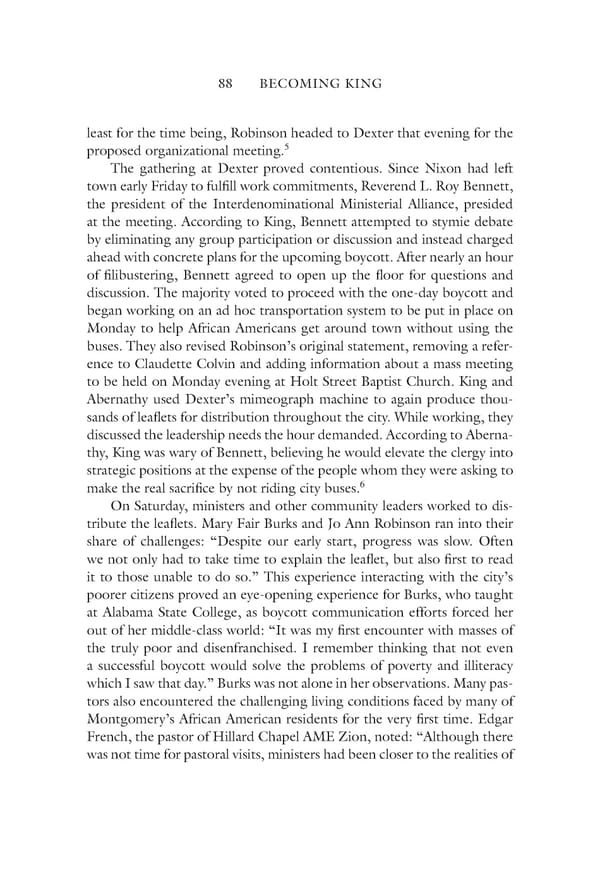88 BECOMING KING least for the time being, Robinson headed to Dexter that evening for the 5 proposed organizational meeting. The gathering at Dexter proved contentious. Since Nixon had left town early Friday to fulfill work commitments, Reverend L. Roy Bennett, the president of the Interdenominational Ministerial Alliance, presided at the meeting. According to King, Bennett attempted to stymie debate by eliminating any group participation or discussion and instead charged ahead with concrete plans for the upcoming boycott. After nearly an hour of filibustering, Bennett agreed to open up the floor for questions and discussion. The majority voted to proceed with the one-day boycott and began working on an ad hoc transportation system to be put in place on Monday to help African Americans get around town without using the buses. They also revised Robinson’s original statement, removing a refer- ence to Claudette Colvin and adding information about a mass meeting to be held on Monday evening at Holt Street Baptist Church. King and Abernathy used Dexter’s mimeograph machine to again produce thou- sands of leaflets for distribution throughout the city. While working, they discussed the leadership needs the hour demanded. According to Aberna- thy, King was wary of Bennett, believing he would elevate the clergy into strategic positions at the expense of the people whom they were asking to 6 make the real sacrifice by not riding city buses. On Saturday, ministers and other community leaders worked to dis- tribute the leaflets. Mary Fair Burks and Jo Ann Robinson ran into their share of challenges: “Despite our early start, progress was slow. Often we not only had to take time to explain the leaflet, but also first to read it to those unable to do so.” This experience interacting with the city’s poorer citizens proved an eye-opening experience for Burks, who taught at Alabama State College, as boycott communication efforts forced her out of her middle-class world: “It was my first encounter with masses of the truly poor and disenfranchised. I remember thinking that not even a successful boycott would solve the problems of poverty and illiteracy which I saw that day.” Burks was not alone in her observations. Many pas- tors also encountered the challenging living conditions faced by many of Montgomery’s African American residents for the very first time. Edgar French, the pastor of Hillard Chapel AME Zion, noted: “Although there was not time for pastoral visits, ministers had been closer to the realities of
 Becoming King: Martin Luther King Jr. Page 108 Page 110
Becoming King: Martin Luther King Jr. Page 108 Page 110